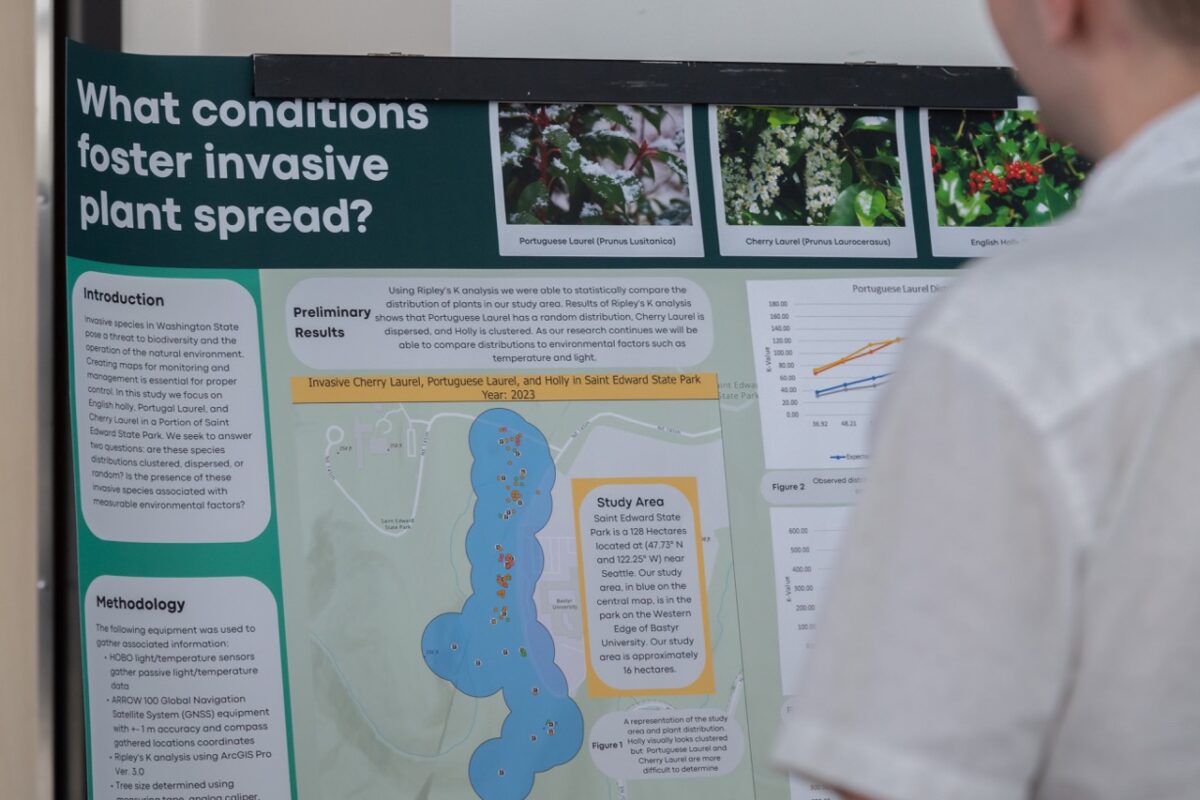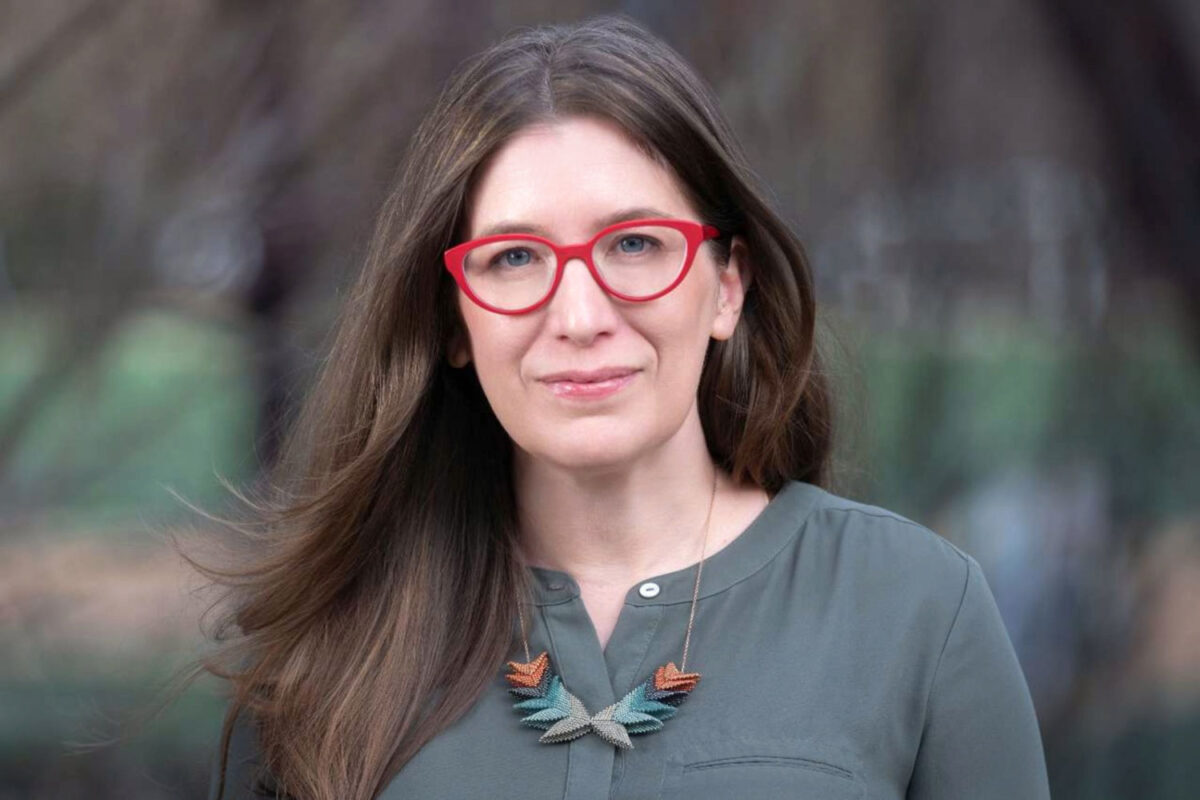On Friday, June 2, the University of Washington Bothell hosted the Student Academic Showcase to feature students’ capstone projects and research from across many academic disciplines. Topics ranged from “Queer Coded Language” to “What conditions foster invasive plant spread?”
This first-time event kicked off with breakfast at the North Creek Events Center, where students and community partners had the opportunity to meet and network. The showcase then included poster presentations at the NCEC as well as more than 25 oral presentations in classrooms across campus.
Many of the projects involved collaboration with community partners. In the case of a project by Dev Nirschl (Earth System Science, ’23) and Nicole Reiber (Earth System Science, ’23), for example, that partner was Viva Farms, a nonprofit organization focused on sustainable farming.
“I would like to express my deepest gratitude to all of our valued community partners,” said Dr. Sharon A. Jones, vice chancellor for academic affairs, in her remarks. “Your unwavering support and commitment have been instrumental in creating opportunities that many of our students have been able to take advantage of. It is through these contributions that we are able to create an enriching academic environment for our students that fosters growth and innovation.”
Identifying the problems
Under the mentorship of Dr. Amy Lambert, associate teaching professor in the School of Interdisciplinary Arts & Sciences, Nirschl and Reiber worked on mitigation and adaptation strategies for seasonal flooding within farm fields. Seasonal flooding can cause many challenges, including a later planting start.
“To come up with solutions, we needed to do some background to learn why this was happening and what could be done within the King County regulatory code,” Reiber said.
Through their research on the soil and landscape features, Reiber and Nirschl determined a high probability of a wetland presence on the site. They then conducted a wetland delineation to confirm if a wetland was present and, if so, to establish its location and size. In the area where seasonal flooding was an issue, they in fact discovered a Category III wetland.
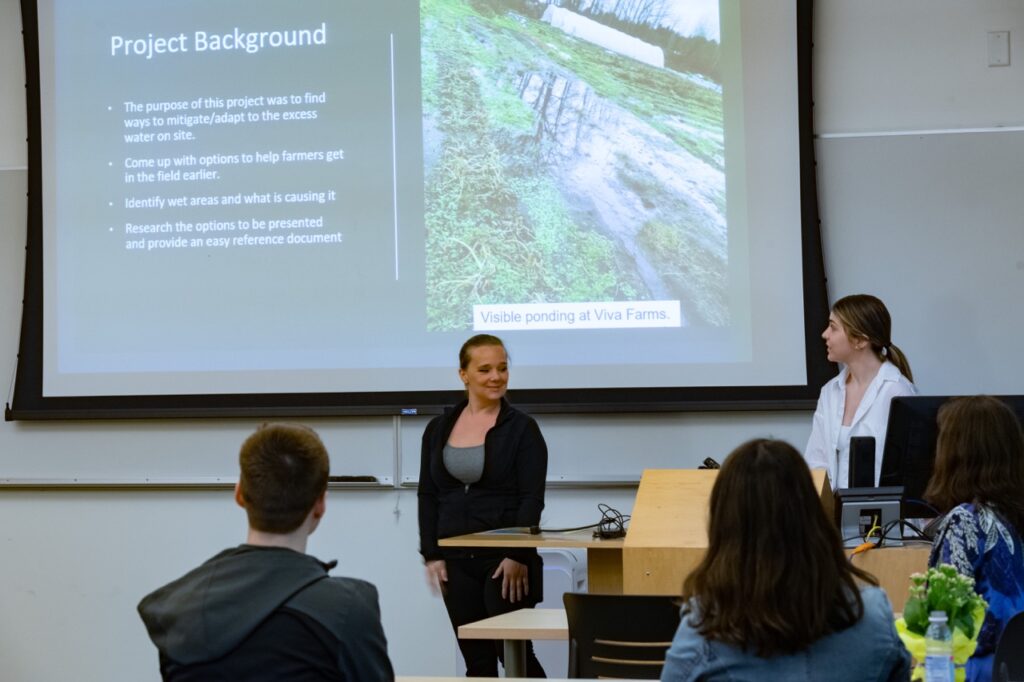
“The presence of a wetland on this site with poorly draining soils explained why the farms experienced seasonal flooding, and the wetter-than-normal conditions explained the restrictions on getting farmers out into the fields during planting season,” Reiber said. What’s more, she and Nirschl also noted in their research reporting that reed canary grass seemed to be clogging the agricultural ditches meant to help with the drainage, further contributing to the excess water.
Mitigating impacts of seasonal flooding
After establishing the cause of seasonal flooding, Reiber and Nirschl next provided the farm with several steps that could mitigate negative impacts.
“We came up with a variety of solutions for them to try to help reduce the excess water on site while keeping within regulatory code,” Reiber said.
One of the solutions they offered included farming practices such as cover crops — crops planted to cover the soil rather than be used for harvest. Other practices included no-till farming, planting vegetation that can handle a more aquatic environment and better maintaining the existing agricultural ditches by removing the reed-canary grass. For drainage maintenance, the team also referred Viva Farms to several best management practice documents and plans. They also connected the nonprofit with the King Conservation District to assist with further ideas for drainage management.
Reiber said her experience and expertise as a wetland consultant came in handy throughout the project and was partly what drew her to collaborate with Viva Farms.
“I chose this topic to research because not only am I passionate about environmental issues, but also I had started working professionally as a wetland consultant and knew agricultural lands are very challenging to delineate and have special case circumstances when it comes to regulatory code,” Reiber said. “I wanted to challenge myself on this project to hone my regulatory environmental skills as well as network with other professionals.”
Experiencing the value of collaboration
While this research project supplied an opportunity for Reiber to hone her skills and work in her chosen career path, it was mutually beneficial in the value it provided to Viva Farms, too.
“This was honestly one of the best, most professional capstone projects I’ve hosted in five years with multiple iterations. Nicole brought her skill and experience to bear and was great at networking and building bridges between academic, government, nonprofit and farming communities,” said Micah Anderson, farm & education manager at Viva Farms King County.
Reiber graduated from UW Bothell last month with a bachelor’s in Earth System Science and a minor in Geographic Information Systems. She is currently an environmental scientist for King County’s Department of Local Services, Road Services Division under the Environmental Unit where she assists with mitigation site monitoring and other environmental monitoring tasks.
Reiber noted that many of the professional connections she made during her time at UW Bothell have transferred over to her career.
“I would encourage students working on projects for their classes, even if it seems like a smaller project, to reach out to professionals doing related work. I have found many to be enthusiastic about working with a student, passing on any advice or knowledge they can,” Reiber said.
Researching the currently incurable
While looking through a research database, Ali Mirzazadeh (Biology, ’23) discovered his plan for doing a research project, “The Effect of Advanced Age and Alzheimer’s Disease Neuropathology on Levels of the Tight Junction Protein, Occludin, in the Brain Microvasculature.”
His great uncle was diagnosed with Parkinson’s disease, and so Mirzazadeh had a personal tie to the topic, having seen firsthand the impacts of the neurodegenerative disease.
“Unfortunately, neurodegenerative diseases are a pretty big issue around the world and increasingly so as the years go by, so if I could be a part of the cause to find a way to stop that and help people, then I would love to do that,” he said.
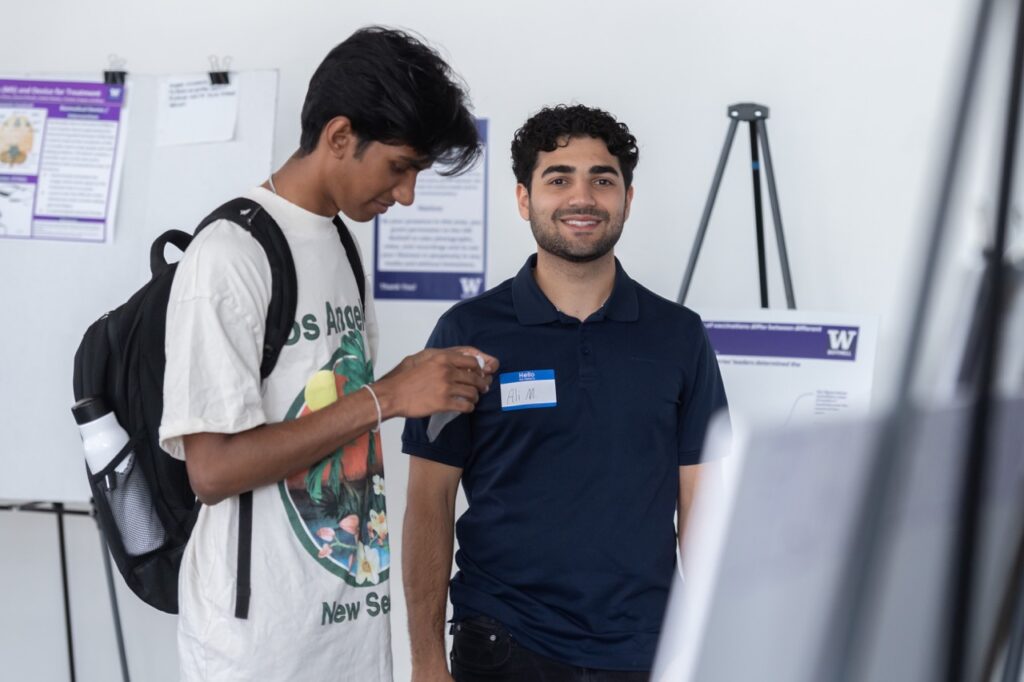
Mirzazadeh worked at the Harborview Medical Center in Seattle under the mentorship of Dr. May Reed, associate professor in the UW’s Department of Medicine, Division of Gerontology and Geriatric Medicine as well as section chief of Geriatric Medicine at Harborview and medical director of the HMC Senior Care Clinic.
His research looked at tight junction proteins in the blood-brain barrier of Alzheimer’s and dementia patients. These proteins restrict blood and toxins from entering the brain and allow important nutrients and ions to pass through the barrier.
Surprising research discoveries
“What can happen in patients who have dementia is their blood brain barrier can become compromised, meaning things like toxins and metals and other harmful things can have a better chance of going into their brain, which can promote neurodegeneration,” Mirzazadeh said.
In the study, he expected to see a lower amount of tight junction proteins — but the opposite turned out to be the case.
“What we basically found was that there’s a compensation mechanism so that the human brain, when it feels like it’s under distress or harm, wants to protect itself by making more tight junction proteins to regulate good things coming in and bad things going out,” he said.
Mirzazadeh noted that these were only preliminary results and that further testing on a wider range of subjects would be needed, but ultimately this information could be used to find ways of increasing the expression of tight junction proteins in patients with early onset dementia.
“If we can find a way to create more tight junction proteins at the start of dementia,” he said, “that could maybe help stop the process of neurodegeneration.”
In addition to presenting this research at the Student Academic Showcase, Mirzazadeh also presented in the UW’s Annual Undergraduate Research Symposium on May 19.
Limitless avenues of research and exploration
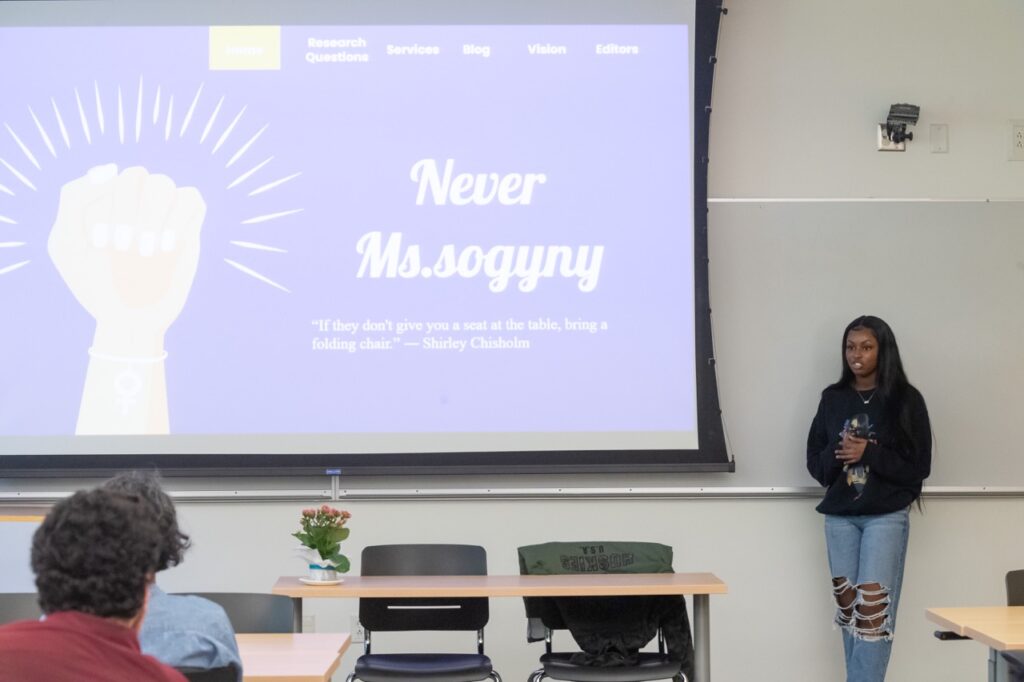
These projects by Mirzazadeh, Nirschl and Reiber are two of the many projects UW Bothell students presented in the Student Academic Showcase. Some of the other presentations included:
- “A Comparative Analysis of Graffiti Abatement Strategies: Seattle and Amsterdam,” presented by Tori Satterfield, mentored by Dr. Yolanda Padilla, associate professor in the School of IAS.
- “Never Mis.ogyny Project,” presented by Binta Sirah Baldeh, mentored by Dr. Julie Shayne, teaching professor in the School of IAS.
- “Functionality and context are highly desirable for expert users working with qualitative data,” presented by Riyansha Goyal, mentored by Dr. Caleb Trujillo, assistant professor in the School of IAS.
Want to learn more? Additional projects can be found on the Student Academic showcase event webpage.
I would encourage students working on projects for their classes, even if it seems like a smaller project, to reach out to professionals doing related work. I have found many to be enthusiastic about working with a student, passing on any advice or knowledge they can.
Nicole Reiber (Earth System Science, ’23)

